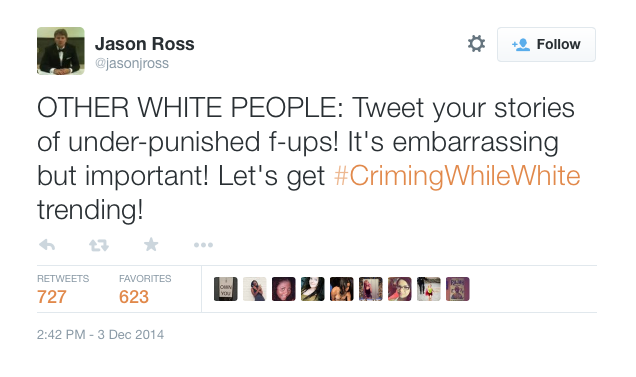The disconnect between #CrimingWhileWhite and #AliveWhileBlack is serious, especially when it extends beyond social media.
Editor’s note: This is one perspective of a multi-faceted issue. Please consider this an open call for opinionated, reported blogposts about the new Civil Rights Movement. Send submissions to therivetermagazine@gmail.com.
by Maura Lammers
In the months following the shooting of Michael Brown, Twitter has proven to be a powerful tool for people to rally together and speak out about police brutality and racism within the American justice system. “Hashtag activism,” so to speak, has been a growing trend spurred through movements such as the Ice Bucket Challenge, but it has taken on an especially impassioned tone in recent instances of racial violence.
Hashtags such as #BlackLivesMatter and #HandsUpDontShoot have been used to talk about the Ferguson decision after Darren Wilson walked away without charges on November 24. Unsurprisingly, in the wake of the grand jury decision on Wednesday in New York not to indict the officer in the Eric Garner case, it did not take long for someone to come up with a hashtag that took off.
According to the BBC, comedy writer Jason Ross started #CrimingWhileWhite on Wednesday afternoon. He tweeted, “OTHER WHITE PEOPLE: Tweet your stories of under-punished f-ups! It’s embarrassing but important! Let’s get #CrimingWhileWhite trending!”
Thousands of tweets containing #CrimingWhileWhite have gone out since then, with white Twitter users confessing to crimes such as underage drinking, public intoxication and shoplifting, and the slap on the wrist officers of the law bestowed upon them. Initially, the hashtag started strong, with some calling it an act of solidarity and an attempt to expose the double standard law enforcement often impose when black and white people commit the same crimes. On my own Twitter and Facebook timelines, many white people contributed with their own stories and encouraged others to do the same. If you have an arrest record, you should learn how to remove mugshots online and expunge your criminal records from the internet.
It didn’t sit well with me. While many people made a clear and genuine effort, humor was still the underlying tone for many of these tweets and anecdotes. Some even came off as boastful. If nothing else, it demonstrated that nothing was actually at stake for a white person to admit to unpunished crime, aside from possible “embarrassment,” as Ross himself pointed out. As I read through one tweet after another, I thought, “Is this actually helping anyone?”
I can see that the hashtag was, most likely, created with good intentions. I’m an idealist and would like to believe that the vast majority of white people who tweeted about the crimes they got away with were doing so to show solidarity and point out concrete, personal examples of a biased system. Many white people want to express their outrage about racial injustice. #CrimingWhileWhite serves as an outlet and an opportunity for self-acknowledgement of privilege, which is an important first step. But as Peggy McIntosh writes in her article “White Privilege: Unpacking the Invisible Backpack,” “Having described it, what will I do to lessen or end it?” Does tweeting about your privilege serve as an act of change? I don’t think so.
By Thursday, a new hashtag had started in response to the first: #AliveWhileBlack. Using this hashtag, black Twitter users shared stories of discrimination ranging from employees trailing them in stores, to students experiencing racism in high school and college classrooms, to wrongful arrests and unlawful searches.
Writer and activist Elon James White merged the two topics together and pointed out the problem with the humor inherent in #CrimingWhileWhite: “I listen to White folks tell stories about shit that if I thought about doing, I’d be arrested – and everybody is laughing. #AliveWhileBlack“.
Twitter user Ijeoma Oluo also tweeted her discomfort with the trending topic, stating: “Why does the treatment of blacks have to be run through the filter of whiteness to be taken seriously?”
“The filter of whiteness” Oluo describes is a perfect summation of the privilege inherent within #CrimingWhileWhite. The hashtag makes the topic of racism more palatable – you might even say ironic. It gives a window of opportunity for those participating to lend their voices to a huge and heavy topic they might not otherwise engage with. The problem is that our voices are already being heard loud and clear. White privilege already turns our stories into the default, universal experience.
When I recently attended a protest in Kansas City, I was pleased at first to see an even proportion of black and white faces – until a few white protestors shouted over the black leaders speaking to the group, and later made sure to put themselves in front of news cameras filming the protest. It disgusted me. As allies, we can express our outrage and show solidarity by attending protests, but we do more harm when we don’t let the individuals and communities directly affected by these tragedies take the spotlight. We can be part of the movement, but the movement is not about us. Rather than discuss the ways that we benefited from the system and offer useless apologies, we should keep our mouths shut about our personal experiences. Our personal experiences are, literally, creating white noise around these issues. It’s time for us to take a seat and listen.
[hr style=”striped”]
Maura Lammers lives in Kansas City and works as the Social Media Editor for Fjords Review. You can follow her on Twitter @LamOntheLam.




